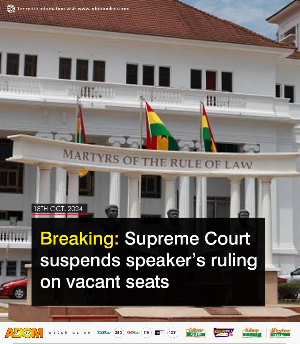
In a significant legal development, Ghana’s Supreme Court has suspended the Speaker of Parliament's ruling on vacant parliamentary seats, sparking widespread reactions across the political spectrum. This move follows a contentious debate about the legality of the Speaker’s decision to declare certain seats vacant, a ruling that could have major implications for the country’s legislative dynamics ahead of the 2024 general elections.
The Speaker's ruling initially targeted members of Parliament whose eligibility had come under question, whether due to absenteeism or legal disputes surrounding their election. The decision was seen as an attempt to uphold parliamentary rules regarding attendance and representation. However, the affected MPs swiftly challenged the ruling in court, arguing that the Speaker overstepped his authority in declaring the seats vacant.
The Supreme Court, acting on these legal challenges, issued an interim injunction suspending the Speaker's ruling. The Court has determined that the matter requires further examination before any action can be taken. The suspension effectively halts any proceedings to replace the affected MPs and maintains the current parliamentary composition until a final judgment is made.
In their decision, the justices emphasized the need for a careful interpretation of parliamentary rules and the constitution. They pointed out that declaring seats vacant is a delicate issue that must align with both constitutional provisions and the rights of elected representatives to serve their constituents.
The Court's ruling has drawn mixed reactions from political parties and analysts. Members of the ruling New Patriotic Party (NPP) have expressed concern that the delay in filling vacant seats could hamper parliamentary business, particularly with key legislative decisions on the horizon. Some members feel that the affected MPs should face the consequences of their actions, whether it’s absenteeism or legal irregularities.
On the other hand, the opposition National Democratic Congress (NDC) has welcomed the Court’s intervention, viewing it as a check on potential overreach by the Speaker. NDC members argue that the Speaker's decision was politically motivated and aimed at weakening the opposition’s influence in Parliament.
Political analysts suggest that the ruling could create uncertainty as the country approaches its elections. With parliamentary representation hanging in the balance, both parties are likely to strategize around how this development might affect their standing in Parliament and their chances in the 2024 elections.
The Supreme Court has yet to set a date for the full hearing of the case, but the outcome is expected to have long-lasting effects on Ghana’s parliamentary operations. In the meantime, the affected MPs will retain their seats, and parliamentary business will proceed without any changes to its composition.
As the legal battle continues, the public and political stakeholders will be watching closely to see how the Supreme Court rules on this critical issue. Many expect the decision to not only impact the current parliament but also set a precedent for how future cases involving vacant seats are handled in Ghana’s legislative system.